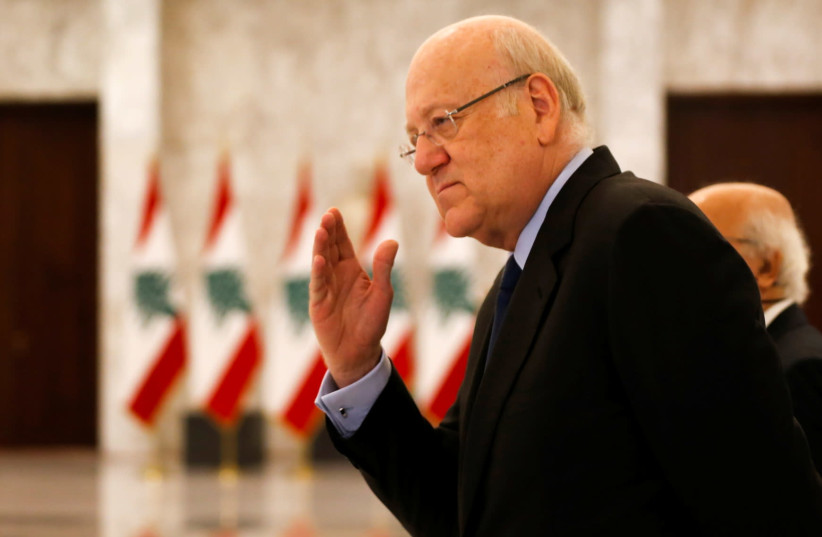The Saudi ambassador to Lebanon will return to Lebanon by the start of Ramadan next week, Lebanese newspaper al-Joumhouria reported on Wednesday, after Lebanese Prime Minister Najib Mikati affirmed the country's commitment to restore relations with Gulf states on Tuesday.
In a statement on Tuesday, Mikati wrote that he had spoken with Kuwaiti Foreign Minister Ahmed Nasser Al-Mohammed Al-Sabah about restoring normal relations between Lebanon and the Gulf Cooperation Council (GCC).
"I renew the commitment of the Lebanese government to take the necessary and required measures to enhance cooperation with the Kingdom of Saudi Arabia and the countries of the Gulf Cooperation Council, Lebanon’s commitment to all the decisions of the Arab League and international legitimacy, and its commitment to serious and actual work to follow up and complete the implementation of its provisions in a manner that guarantees civil peace and national stability for Lebanon and fortifies its unity," Mikati wrote in the statement.
The Lebanese prime minister stressed the need to end all political, military, security and media activities originating from Lebanon that affect the "sovereignty, security and stability" of Saudi Arabia and other GCC countries.
Mikati also renewed his commitment to combat the smuggling of contraband, especially drugs, to Saudi Arabia and other GCC countries from Lebanon. He additionally affirmed Beirut's commitment to the Riyadh Agreement on judicial cooperation and the extradition of wanted persons to Saudi Arabia.

Lebanon would work to "prevent the use of Lebanese financial and banking channels to conduct any financial transactions that might harm the security of the Kingdom of Saudi Arabia and the countries of the GCC," the prime minister said.
The Saudi Foreign Ministry welcomed Mikati's statements on Tuesday, saying it "hopes that this will contribute to Lebanon's restoration of its role and status in the Arab and international arenas."
The Kuwaiti Foreign Ministry also welcomed the prime minister's statements, saying it looked forward to "completing constructive and practical measures in this regard."
A DIPLOMATIC crisis exploded in November after Saudi Arabia expressed outrage against comments made by then Lebanese information minister George Kordahi supporting the Iran-backed Houthi rebels in Yemen and criticizing the military intervention led by Saudi Arabia, calling the war in the country "futile."
Saudi Arabia and the UAE, along with other Gulf states, withdrew their diplomatic envoys and expelled Lebanese envoys in response to the comments. The Saudis also designated the financial charity body Al-Qard Al-Hasan Association, which is linked to Hezbollah, as a terrorist entity, saying it "works on managing funds for the terrorist organization (Hezbollah) and its financing."
Gulf states have expressed strong condemnations of Hezbollah in recent months, linking the movement to the Iran-backed Houthi militant group in Yemen.
Even though Kordahi is a Maronite Christian, he received support from the Hezbollah movement who expressed strong opposition against calls for the minister to resign. The movement claimed Saudi Arabia was "waging war" on Lebanon with its diplomatic measures issued in response to Kordahi's statements. The information minister resigned in December in light of the moves made by the Gulf states.
Arab and Lebanese diplomatic sources told al-Joumhouria on Tuesday that Saudi Ambassador Walid al-Bukhari will return to Beirut at the end of this week or, at the latest, by the beginning of Ramadan which starts next week.
A senior political source told the newspaper that the statements by the Saudi and Kuwait foreign ministries were a "positive sign," adding, however, that it was too early to tell how long it would take for relations to completely return to normal.
Government sources also told the paper that Mikati's statement took into account the current situation in Lebanon, the Arab world and internationally, adding that the "positive repercussions" of the statement on the overall situation in Lebanon would "soon become clear."
"Informed sources" stated that the moves by Mikati and Saudi Arabia come amid planned talks concerning Yemen, Saudi-Iranian talks (which have stalled in recent weeks), the recent visit of Syrian President Bashar Assad to the United Arab Emirates and ongoing talks between Iran and world powers to return to the JCPOA nuclear deal, Al-Joumhouria wrote.
Iranian Foreign Minister Hossein Amirabdollahian led a Foreign Ministry delegation to Syria on Wednesday to meet with senior Syrian officials and discuss the development of bilateral relations, regional developments and the situation around the world.
